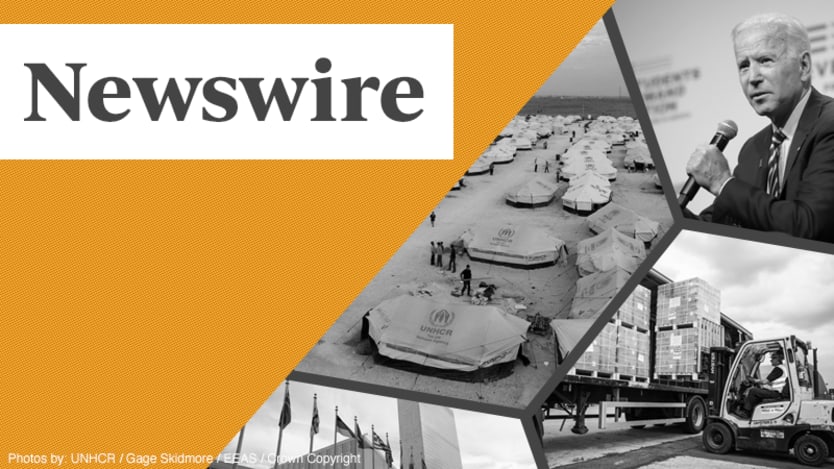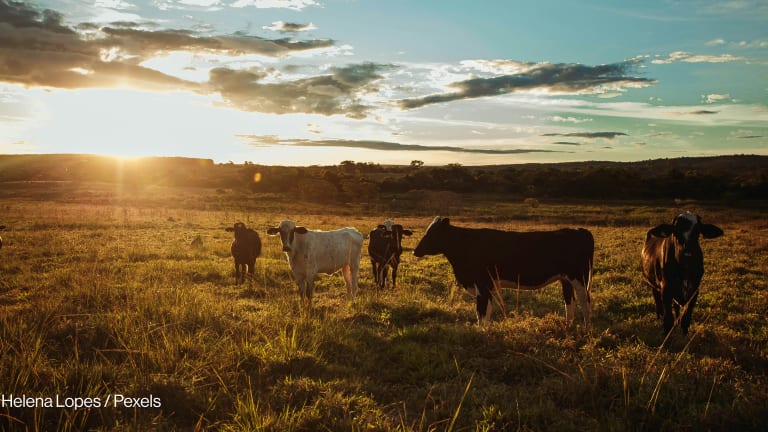
Edrick Bmambale is a field extension officer who works with farmers in southwestern Uganda. He drives from field to field by motorcycle — but now, through a partnership with the U.S. space agency, his helmet is affixed with a camera that links crop data to geospatial imagery.
This is a preview of Newswire
Sign up to this newsletter for an inside look at the biggest stories in global development, in your inbox daily.
NASA Harvest is the agency’s food security and agriculture program, and Helmets Labeling Crops is a new ground data collection project in Uganda and Kenya.
Catherine Cheney reports that “advancements in remote sensing, cloud computing, and machine learning are leading earth observation data to play an increasingly central role in agriculture.” But while these technologies are revolutionizing agriculture in many parts of the world, their applications remain out of reach for many smallholder farmers.
Helmets Labeling Crops collects huge amounts of imagery and then uses machine learning to recognize the crops pictured. This data is turned into crop type maps, which can help farmers understand how their small plot of land compares to surrounding areas, recognize patterns, and make predictions for the future.
As data and analytics tools become more available, turning them into meaningful policies and plans requires more technical expertise and institutional capacity, says Catherine Nakalembe, the Africa program director under NASA Harvest.
“You need computers that actually work. You need internet. You need data scientists. And I don’t know how many governments are willing to pay data scientists what they pay ministers. But that’s what data scientists are paid,” she says.
Read: How to make satellite data useful for farmers facing climate change
+ Happening soon: Today, at 10 a.m. ET (4 p.m. CET), we’re hosting a conversation on the critical role geospatial data can play in sustainable cities. Save your spot here.
Meet and greet
The Organisation for Economic Co-operation and Development counts four member countries from Latin America and the Caribbean: Chile, Costa Rica, Colombia, and Mexico. Miguel Tamonan and Janadale Coralde take a look at each of these country’s aid agencies — whose estimated 2019 development cooperation amounts range from $6.2 million to $72.8 million — and their key priorities and funding trends.
Devex Pro: Get to know these 4 Latin American aid donors
+ Catch up on the recent Devex Newsmaker event, Shaping growth in Latin America: A conversation with Luis Alberto Moreno, wherein we explored both the underlying causes of the recent setbacks across Latam and what can be done to support economic recovery.
Business as usual
The scandal surrounding data manipulation in the World Bank’s Doing Business report has raised troubling questions about the objectivity of international financial institutions that answer to political shareholders. But addressing statistical irregularities and political pressures in the influential Doing Business project would not be enough, write Vinod Thomas and Robert Picciotto.
Opinion: The real problem in the World Bank’s Doing Business indicator
+ICYMI: Shabtai Gold has a recap of the 2021 World Bank-IMF annual meetings. Devex Pro subscribers can also learn more about the possible future of Doing Business. Not yet a Pro subscriber? Sign up now and start your 15-day free trial.
Bills, bills, bills
The U.S. Senate Appropriations Committee released its fiscal year 2022 international affairs budget on Monday, which includes $60.56 billion in funding for the Department of State, U.S. Agency for International Development, and other international agencies. That comes a bit short of the House of Representatives’ $62.2 billion budget bill, which passed in August, but higher than President Joe Biden’s proposal. Both the Senate and House bills propose to repeal restrictions — and restore funding — for family planning.
TB continued
A new fingerstick blood test was shown to meet the World Health Organization’s minimum specifications for a tuberculosis triage test, which can identify likely TB cases in need of further testing.
“We wanted to present our interim findings because we thought they were so good that we wanted it to get out in the public domain,” says Jayne Sutherland, the study’s lead.
Read: Fingerstick blood test can be a promising TB screening tool, study finds
+ For more content like this, sign up for Devex CheckUp, the must-read weekly newsletter for exclusive global health news and insider insights.
Crisis consensus
“[Climate change adaptation] action is in the interests of all nations, to prevent cascading food insecurity, migration and conflict across the world.”
— Chatham HouseA new paper by the think tank Chatham House — drawing on the opinions of 200 experts — concludes that “decisive action” is needed within a decade to prepare countries in Africa and Asia for the impacts of climate change.
Read: ‘Urgent adaptation action’ needs financing, says climate change report
Learn more: Climate change philanthropy is rising, but not quickly enough, says report
In other news
Brazilian lawmakers have recommended that President Jair Bolsonaro be charged with crimes against humanity for his failure to respond to the pandemic, which has killed more than 600,000 Brazilians. [New York Times]
An estimated 3 million people in Myanmar are in urgent need of humanitarian aid since the military takeover of the country in February. [UN News]
The number of children killed or injured because of the conflict in Yemen has reached 10,000, but the real toll could be much higher, according to UNICEF. [Deutsche Welle]
Sign up to Newswire for an inside look at the biggest stories in global development.








